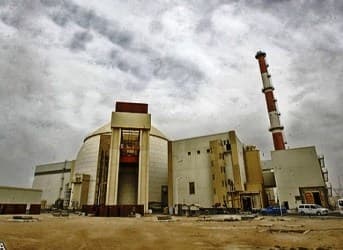Iran’s controversial nuclear power plant at Bushehr is entering its final staging with a series of new tests due to be performed shortly, after which the site is expected to become fully operational by early 2013, according to official government reports from Tehran.
"The preparations for the handover of the power plant by the Russian contractor to Iranian experts will be made in the near future. After various tests and experiments at the Bushehr power plant, we will begin the preliminary launch of the project by Iranian experts between December 21 to February 18,2013," stated a report from the Mehr news agency.
The agency was quoting Fereydoun Abbasi, director of Iran's Atomic Energy organization, who addressed reporters at Bushehr last Saturday.
In an earlier statement made last month Valeryi Limarenko, the director general of NIAEP, the agency that manages the construction of the plant for the Russian contractor Atomstroy export said it is possible the plant won't be handed over to Iranian experts until March next year due to “technical problems,” the agency said. Limarenko said that even after Iran takes control of the plant, some 300 Russian experts would remain at the site to continue assisting Iranian operators of the plant.
Related Article: East Coast Nuclear Power Plants Dodge Hurricane Devastation - For Now
Meanwhile, coinciding with the Iranian report, Britain’s Sunday Times says Israel fears a conventional assault on Iran's nuclear site may fail to accomplish the job after evidence from unnamed Western defense experts revealed that Tehran has hidden its uranium enrichment capacity deep underground, safe from conventional airstrikes.
Indeed, several reports from Iran obtained by members of Iranian opposition groups inside the country and made available to Western intelligence agencies demonstrates levels of extreme precaution undertaken by Iran to safeguard its facilities from attack. These facilities in Bushehr, as in other locations are buried deep under mountains and are located close to civilian population centers, rendering an attack using nuclear warheads extremely dangerous given the fallout it will have on the nearby residents.
Recent intelligence reports shows Iran is speeding up its uranium enrichment at the Fordow site and has successfully installed 5,000 twin centrifuges, Iranian opposition sources confirmed this report from the Sunday Times in London.
The experts said this limits Israel's response to two options -- either deploying special forces to perpetrate a ground attack or using ballistic missiles carrying tactical nuclear warheads.
Related Article: Boron: A New Nuclear Fuel Which Holds Far More Energy than Originally Thought
Israel, according to several sources, has been practicing bombing raids on mock sites it has erected in the Negev Desert in southern Israel. One US military source who asked not to be named because of the sensitivity of the subject, told Oilprice.com that he had seen “a number of Israeli war planes take off from bases in southern Israel, armed with heavy bombs and return without them.” An indication that Israel may be conducting live fire practice runs.
In either case, an attack using tactical warheads or ground forces would lead to a dangerous escalation of the already explosive situation on the ground in the Middle East.
Iran is highly unlikely to remain quiet to an attack on its nuclear facilities and chances are its reply will not be limited to lodging a complaint at the United Nations Security Council. The repost from the Islamic Republic could come in a number of ways.
Iran could deploy its proxy forces along Israel’s borders; Lebanon’s Hezbollah militia along Israel’s northern border and Hamas along its southern frontier. Both groups are heavily armed, especially Hezbollah, who comes equipped with all the trimmings of a modern army and whose arsenal included short range missiles capable of hitting heavily populated civilian areas in the northern part of the country.
ADVERTISEMENT
Iran could also launch an international retaliatory campaign, stringing at Israeli and Western interested in Europe, Latin America and the Middle East.
The solution to this crisis remains that of the negotiation table and not the battlefield. Before his re-election to a second term at the White House, US President Barack Obama had announced that Iran would be had agreed to initiate talks with the United States. But Iran had agreed to talks in the past only to later renege.
By. Claude Salhani
Claude Salhani, a specialist in conflict resolution, is an independent journalist, political analyst and author of several books on the region. His latest book, 'Islam Without a Veil,' is published by Potomac Books. He tweets @claudesalhani.


















